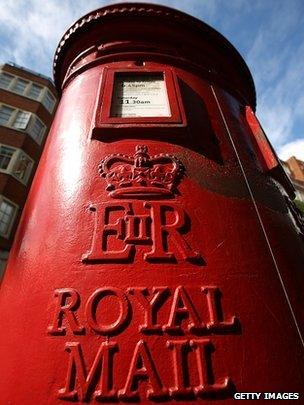Brian Taylor: By Royal (Mail) appointment
- Published
It was, we are assured, a grand design - and not in any way an example of policy on the hoof. The renationalisation of the Royal Mail in Scotland, that is.
Perhaps one should say the putative renationalisation because, of course, the sale has yet to take place. That, say Team Salmond, is key. They argue that concerted political opposition could yet thwart the project.
But I am getting ahead of myself. A brief recap.
The UK government has proposed to privatise the Royal Mail via a shares flotation (note, not the post office which is distinct.)
A majority stake in the business will be offered for sale although the exact percentage has yet to be determined.
Alex Salmond urged a moratorium pending the independence referendum on the grounds that Royal Mail was, in part, a Scottish asset which should not be sold without the people of a potentially independent Scotland having a say.
However, Scottish ministers have declined - until today - to state specifically what they would do in the event that the sale goes ahead (and independence likewise.)
Indeed, as recently as last night, Finance Secretary John Swinney repeatedly sidestepped the question when challenged by my estimable colleague Glenn Campbell on the BBC Scotland debate, Choosing Scotland's Future.
Mr Swinney noted the uncertainty which attended the details of the sale.
Today, questioned in the chamber, Mr Salmond first restated his call for a moratorium.
He then said that a Scottish government led by him would "seek" to bring Royal Mail back into public hands.
Finally, challenged by Gavin Brown of the Conservatives, he said that such a government "will" return the Royal Mail to public ownership.
Cue SNP cheering. Their ranks plainly calculate that the sale of the Royal Mail is unpopular - and that offering to reverse it will be consequently popular.
Members of the wicked media then pursued the issue with Scottish Government officials and special advisers at the regular Holyrood briefing which follows questions.

The UK government has proposed to privatise the Royal Mail via a shares flotation
Was it, I asked, an explicit strategy or policy on the hoof? The former, I was assured.
The previous statements had been leading up to today's remarks.
Others piled in. Presumably, if it was an explicit strategy, then costings would be available.
The response was that it was impossible to be precise about costings because the shares prospectus had yet to be issued - and it was not clear yet what percentage of the operation would end up in private hands.
Opposition parties joined in. Or, more precisely, those parties which form the UK coalition which is proposing the sale. Mr Salmond, asserted the Tories and the Lib Dems (separately), was being reckless.
Mr Brown, who posed the question in the chamber, said that Scotland would be faced with a huge bill at the outset of independence if such a proposal went through: for shares purchase; potentially, for pension entitlement; and for the investment in the business which is, according to UK ministers, the purpose of the sale in the first place.
Expect the next stage from SNP ministers to be a challenge to Labour to follow suit and promise renationalisation.
Labour has sought to pre-empt any such challenge from the SNP. Their shadow minister at Westminster, Ian Murray, agrees that the best solution is not to privatise the Royal Mail at all.
But he describes the FM's initiative as "another off the cuff, uncosted promise".
Mr Murray adds that the geographical nature of Scotland makes postal services the most expensive to maintain in the UK. And he challenges the SG to set out their costings.